北师大版(2019)选择性必修第一册Unit3 Conservation Lesson3 The Road to Destruction reading 课件(16张ppt)
文档属性
| 名称 | 北师大版(2019)选择性必修第一册Unit3 Conservation Lesson3 The Road to Destruction reading 课件(16张ppt) | 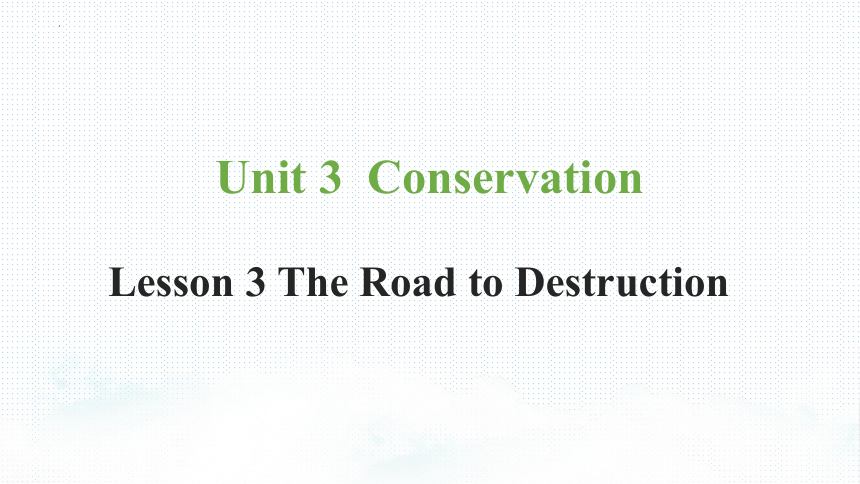 | |
| 格式 | zip | ||
| 文件大小 | 21.8MB | ||
| 资源类型 | 教案 | ||
| 版本资源 | 北师大版(2019) | ||
| 科目 | 英语 | ||
| 更新时间 | 2022-06-18 14:02:22 | ||
图片预览

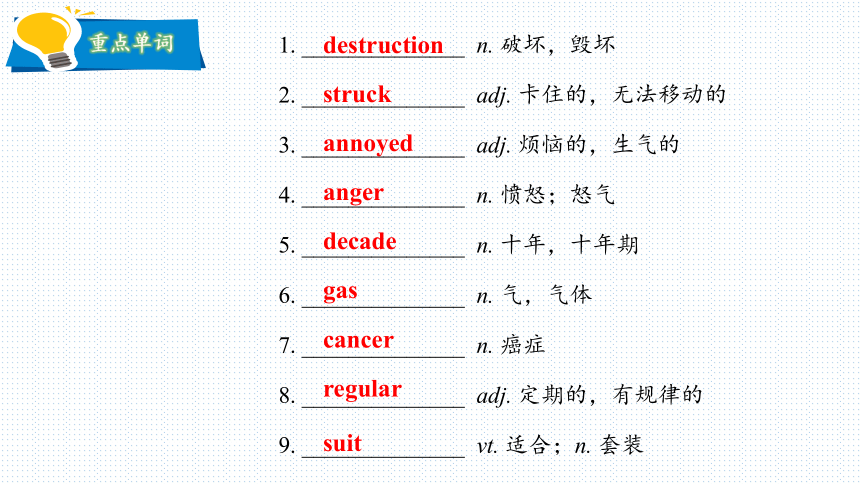
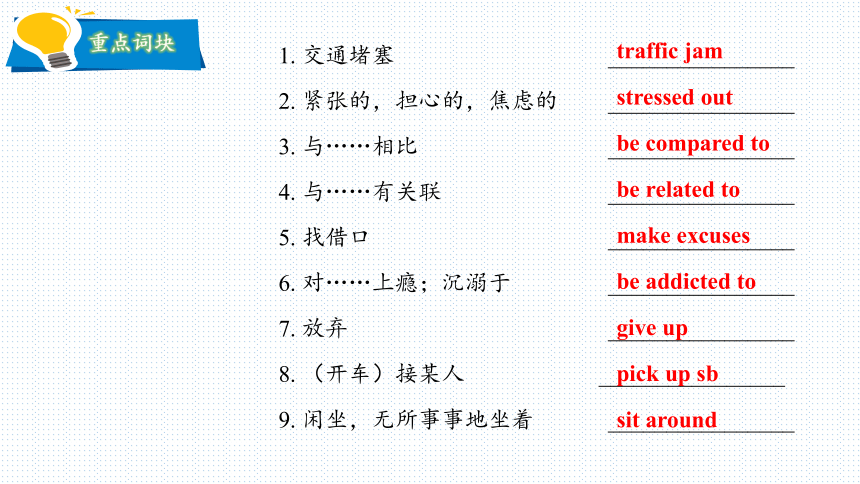
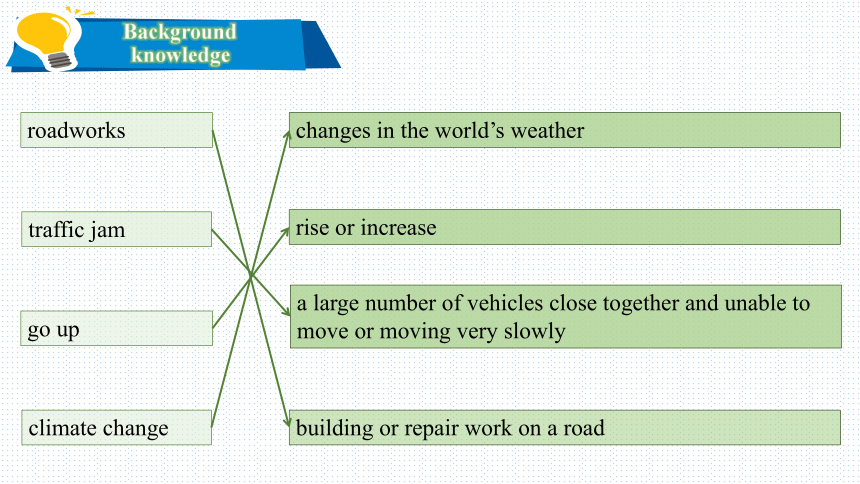
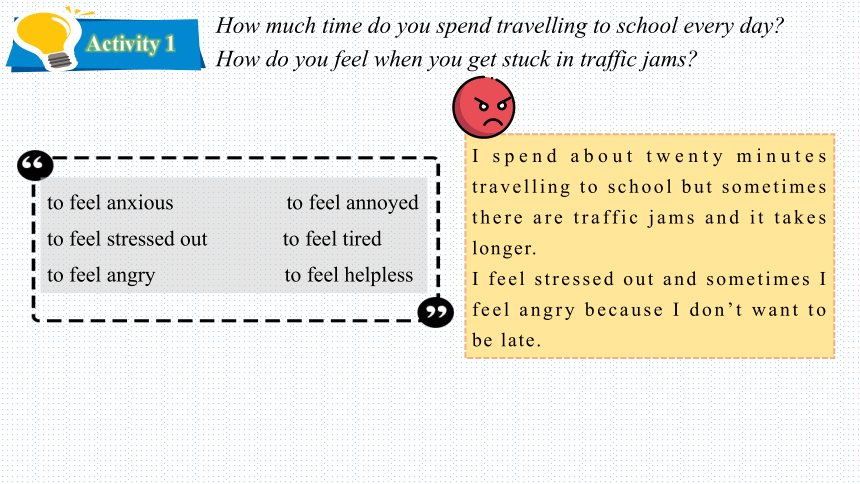
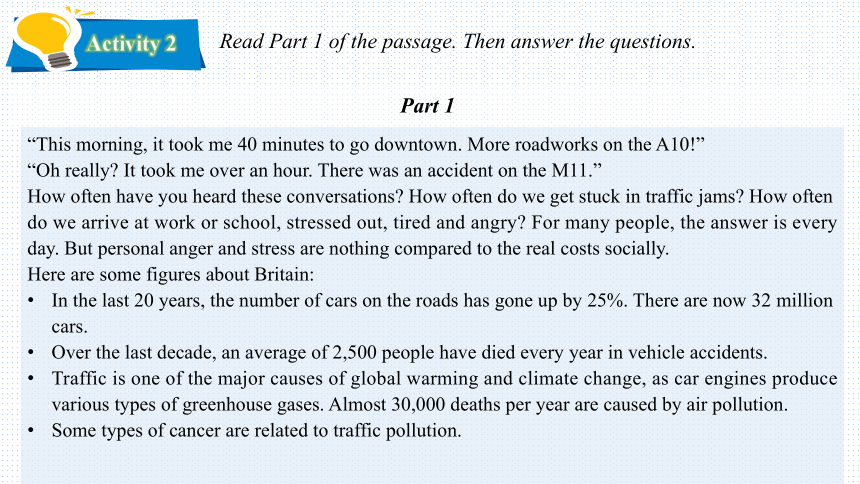
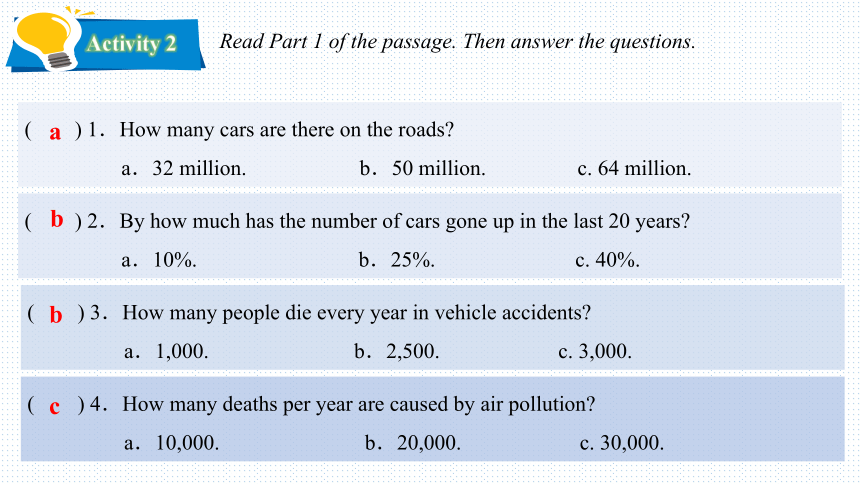
文档简介
(共16张PPT)
Unit 3 Conservation
Lesson 3 The Road to Destruction
重点单词
1. ______________ n. 破坏,毁坏
2. ______________ adj. 卡住的,无法移动的
3. ______________ adj. 烦恼的,生气的
4. ______________ n. 愤怒;怒气
5. ______________ n. 十年,十年期
6. ______________ n. 气,气体
7. ______________ n. 癌症
8. ______________ adj. 定期的,有规律的
9. ______________ vt. 适合;n. 套装
destruction
struck
annoyed
anger
decade
gas
cancer
regular
suit
重点词块
1. 交通堵塞 ________________
2. 紧张的,担心的,焦虑的 ________________
3. 与……相比 ________________
4. 与……有关联 ________________
5. 找借口 ________________
6. 对……上瘾;沉溺于 ________________
7. 放弃 ________________
8. (开车)接某人 ________________
9. 闲坐,无所事事地坐着 ________________
traffic jam
stressed out
be compared to
be related to
make excuses
be addicted to
give up
pick up sb
sit around
Background knowledge
roadworks
traffic jam
go up
climate change
building or repair work on a road
a large number of vehicles close together and unable to move or moving very slowly
rise or increase
changes in the world’s weather
Activity 1
How much time do you spend travelling to school every day How do you feel when you get stuck in traffic jams
to feel anxious to feel annoyed
to feel stressed out to feel tired
to feel angry to feel helpless
I spend about twenty minutes travelling to school but sometimes there are traffic jams and it takes longer.
I feel stressed out and sometimes I feel angry because I don’t want to be late.
Activity 2
Read Part 1 of the passage. Then answer the questions.
“This morning, it took me 40 minutes to go downtown. More roadworks on the A10!”
“Oh really It took me over an hour. There was an accident on the M11.”
How often have you heard these conversations How often do we get stuck in traffic jams How often do we arrive at work or school, stressed out, tired and angry For many people, the answer is every day. But personal anger and stress are nothing compared to the real costs socially.
Here are some figures about Britain:
In the last 20 years, the number of cars on the roads has gone up by 25%. There are now 32 million cars.
Over the last decade, an average of 2,500 people have died every year in vehicle accidents.
Traffic is one of the major causes of global warming and climate change, as car engines produce various types of greenhouse gases. Almost 30,000 deaths per year are caused by air pollution.
Some types of cancer are related to traffic pollution.
Part 1
( ) 1.How many cars are there on the roads
a.32 million. b.50 million. c. 64 million.
Activity 2
( ) 2.By how much has the number of cars gone up in the last 20 years
a.10%. b.25%. c. 40%.
( ) 3.How many people die every year in vehicle accidents
a.1,000. b.2,500. c. 3,000.
a
b
b
( ) 4.How many deaths per year are caused by air pollution
a.10,000. b.20,000. c. 30,000.
c
Read Part 1 of the passage. Then answer the questions.
Activity 3
Read Part 1 more carefully. Complete the notes in the diagram. Then think about any possible solutions to the problems.
Traffic
problems
Effects: personal
angry
stressed out
tired
Effects: social
traffic accidents
global warming and climate change
deaths and cancer by air pollution
Possible solutions:
Taking Notes (2)
Taking notes when reading a text is very similar to taking notes when listening (see Book 3, Unit 8).
Read the text quickly to get the general idea of the text.
Decide what kind of information you are looking for, e.g. names, places, dates, events, reasons, feelings or numbers.
Remember: Don’t try to write in full sentences; use abbreviations and symbols.
Skill Builder
ride a bike
take public transportation
...
We know that cars are bad for us. But we all make excuses: “The buses are terrible”; “The trains are always late”; “I haven’t got time to walk”. I’m talking about myself, too. To be frank, I’m addicted to my car. When I asked a friend working for a green-living organisation for advice about how to give up, she told me five things:
Use your legs. In 2014, over 55% of car journeys were under eight kilometres. Instead of taking short car journeys, we could easily walk or cycle. Leg power can save your money, keep you fit and help you live longer. Regular exercise also cuts the risk of heart disease by 50%!
Activity 4
Read Part 2 and complete the notes.
Part 2
Use public transport. Up to 90 people can travel in one bus, while the same number will need at least 18 cars.
Sometimes it can take a little bit longer, but so what You can relax, read a book, talk to someone—who knows
Think before you go. Do you really have to go to that shopping centre on the other side of town What about the shops around the corner Before you get into your car, think about whether you really need to make that journey.
Share cars. If you really have to use a car, share journeys with someone else. It is much cheaper and kinder to the environment.
Activity 4
Read Part 2 and complete the notes.
Take action! We often think there is nothing we can do about the noise, pollution and danger of traffic. There is. If your street is full of heavy traffic, talk to your neighbours about it. Write to the papers. Go to the city government. Ask for a speed limit. Do whichever of these things that suit you. Don’t just sit around and complain!
All quite simple, isn’t it Five easy ways to improve our environment. Well, I’m sorry I have to finish this article, but I’ve got to pick up my daughter from school at 4 pm. Then I’ve got to drive to the supermarket to do the shopping. After that, I have to take my son to a party. The traffic is going to be horrible, but what can l do
Activity 4
Read Part 2 and complete the notes.
Activity 4
Read Part 2 and complete the notes.
Solutions / Advice
Think before you go.
Share cars.
Take action.
Walk / cycle more
Use public transport.
Activity 5
Look at the Word Builder. Match the words (1-8) with the endings (a-h) to form common collocations. Then use the collocations to complete the summary.
1 make
2 get stuck
3 be
4 protect
5 do
6 pick
7 cause
8 share
a addicted to
b a lot of harm
c cars
d in a traffic jam
e up sb
f the environment
g excuses
h global warming
Word Builder
Activity 5
Look at the Word Builder. Match the words (1-8) with the endings (a-h) to form common collocations. Then use the collocations to complete the summary.
make excuses get stuck in a traffic jam be addicted to protect the environment
do a lot of harm pick up sb cause global warming share cars
Many people often 1___________________ when they go to work. How annoyed and stressful they often feel! But the problem is that the number of cars is still going up. Traffic pollution has been found to 2___________________ and climate change to a large degree.Too many cars 3_________________ to the environment and our health. Some advice has been given for people to help 4____________________, for example, using public transport or 5_________________, doing your shopping in the shop just around the corner instead of driving to the other side of town. However, people 6_________________ using cars. They 7_________________ for using their cars, “I need to 8_________________ my daughter. What can I do ”
get stuck in a traffic jam
cause global warming
do a lot of harm
protect the environment
sharing cars
are addicted to
make excuses
pick up
Word Builder
句子鉴赏
(P58) How often do we arrive at work or school, stressed out, tired and angry
又有多少次,当我们抵达工作地点或者学校时感到心力交瘁、心烦气躁呢?
stressed out 紧张的,担心的,焦虑的。如:
I was really stressed out before the exam. 考试之前,我非常焦虑。
(P58) How often do we get stuck in traffic jams
有多少次我们碰到交通堵塞而动弹不得?
get stuck 卡住的,无法移动的。如:
His legs got stuck in the hole. He couldn’t move. 他的双腿卡在洞里了。他动不了。
(P58) But personal anger and stress are nothing compared to the real costs socially.
但是和真正的社会损失相比,个人的愤怒和焦虑根本不值一提。
compared to 与……相比。如:
It dropped by 13% compared to the same period a year ago. 与去年同期相比下降了13%。
Thank You!
Unit 3 Conservation
Lesson 3 The Road to Destruction
重点单词
1. ______________ n. 破坏,毁坏
2. ______________ adj. 卡住的,无法移动的
3. ______________ adj. 烦恼的,生气的
4. ______________ n. 愤怒;怒气
5. ______________ n. 十年,十年期
6. ______________ n. 气,气体
7. ______________ n. 癌症
8. ______________ adj. 定期的,有规律的
9. ______________ vt. 适合;n. 套装
destruction
struck
annoyed
anger
decade
gas
cancer
regular
suit
重点词块
1. 交通堵塞 ________________
2. 紧张的,担心的,焦虑的 ________________
3. 与……相比 ________________
4. 与……有关联 ________________
5. 找借口 ________________
6. 对……上瘾;沉溺于 ________________
7. 放弃 ________________
8. (开车)接某人 ________________
9. 闲坐,无所事事地坐着 ________________
traffic jam
stressed out
be compared to
be related to
make excuses
be addicted to
give up
pick up sb
sit around
Background knowledge
roadworks
traffic jam
go up
climate change
building or repair work on a road
a large number of vehicles close together and unable to move or moving very slowly
rise or increase
changes in the world’s weather
Activity 1
How much time do you spend travelling to school every day How do you feel when you get stuck in traffic jams
to feel anxious to feel annoyed
to feel stressed out to feel tired
to feel angry to feel helpless
I spend about twenty minutes travelling to school but sometimes there are traffic jams and it takes longer.
I feel stressed out and sometimes I feel angry because I don’t want to be late.
Activity 2
Read Part 1 of the passage. Then answer the questions.
“This morning, it took me 40 minutes to go downtown. More roadworks on the A10!”
“Oh really It took me over an hour. There was an accident on the M11.”
How often have you heard these conversations How often do we get stuck in traffic jams How often do we arrive at work or school, stressed out, tired and angry For many people, the answer is every day. But personal anger and stress are nothing compared to the real costs socially.
Here are some figures about Britain:
In the last 20 years, the number of cars on the roads has gone up by 25%. There are now 32 million cars.
Over the last decade, an average of 2,500 people have died every year in vehicle accidents.
Traffic is one of the major causes of global warming and climate change, as car engines produce various types of greenhouse gases. Almost 30,000 deaths per year are caused by air pollution.
Some types of cancer are related to traffic pollution.
Part 1
( ) 1.How many cars are there on the roads
a.32 million. b.50 million. c. 64 million.
Activity 2
( ) 2.By how much has the number of cars gone up in the last 20 years
a.10%. b.25%. c. 40%.
( ) 3.How many people die every year in vehicle accidents
a.1,000. b.2,500. c. 3,000.
a
b
b
( ) 4.How many deaths per year are caused by air pollution
a.10,000. b.20,000. c. 30,000.
c
Read Part 1 of the passage. Then answer the questions.
Activity 3
Read Part 1 more carefully. Complete the notes in the diagram. Then think about any possible solutions to the problems.
Traffic
problems
Effects: personal
angry
stressed out
tired
Effects: social
traffic accidents
global warming and climate change
deaths and cancer by air pollution
Possible solutions:
Taking Notes (2)
Taking notes when reading a text is very similar to taking notes when listening (see Book 3, Unit 8).
Read the text quickly to get the general idea of the text.
Decide what kind of information you are looking for, e.g. names, places, dates, events, reasons, feelings or numbers.
Remember: Don’t try to write in full sentences; use abbreviations and symbols.
Skill Builder
ride a bike
take public transportation
...
We know that cars are bad for us. But we all make excuses: “The buses are terrible”; “The trains are always late”; “I haven’t got time to walk”. I’m talking about myself, too. To be frank, I’m addicted to my car. When I asked a friend working for a green-living organisation for advice about how to give up, she told me five things:
Use your legs. In 2014, over 55% of car journeys were under eight kilometres. Instead of taking short car journeys, we could easily walk or cycle. Leg power can save your money, keep you fit and help you live longer. Regular exercise also cuts the risk of heart disease by 50%!
Activity 4
Read Part 2 and complete the notes.
Part 2
Use public transport. Up to 90 people can travel in one bus, while the same number will need at least 18 cars.
Sometimes it can take a little bit longer, but so what You can relax, read a book, talk to someone—who knows
Think before you go. Do you really have to go to that shopping centre on the other side of town What about the shops around the corner Before you get into your car, think about whether you really need to make that journey.
Share cars. If you really have to use a car, share journeys with someone else. It is much cheaper and kinder to the environment.
Activity 4
Read Part 2 and complete the notes.
Take action! We often think there is nothing we can do about the noise, pollution and danger of traffic. There is. If your street is full of heavy traffic, talk to your neighbours about it. Write to the papers. Go to the city government. Ask for a speed limit. Do whichever of these things that suit you. Don’t just sit around and complain!
All quite simple, isn’t it Five easy ways to improve our environment. Well, I’m sorry I have to finish this article, but I’ve got to pick up my daughter from school at 4 pm. Then I’ve got to drive to the supermarket to do the shopping. After that, I have to take my son to a party. The traffic is going to be horrible, but what can l do
Activity 4
Read Part 2 and complete the notes.
Activity 4
Read Part 2 and complete the notes.
Solutions / Advice
Think before you go.
Share cars.
Take action.
Walk / cycle more
Use public transport.
Activity 5
Look at the Word Builder. Match the words (1-8) with the endings (a-h) to form common collocations. Then use the collocations to complete the summary.
1 make
2 get stuck
3 be
4 protect
5 do
6 pick
7 cause
8 share
a addicted to
b a lot of harm
c cars
d in a traffic jam
e up sb
f the environment
g excuses
h global warming
Word Builder
Activity 5
Look at the Word Builder. Match the words (1-8) with the endings (a-h) to form common collocations. Then use the collocations to complete the summary.
make excuses get stuck in a traffic jam be addicted to protect the environment
do a lot of harm pick up sb cause global warming share cars
Many people often 1___________________ when they go to work. How annoyed and stressful they often feel! But the problem is that the number of cars is still going up. Traffic pollution has been found to 2___________________ and climate change to a large degree.Too many cars 3_________________ to the environment and our health. Some advice has been given for people to help 4____________________, for example, using public transport or 5_________________, doing your shopping in the shop just around the corner instead of driving to the other side of town. However, people 6_________________ using cars. They 7_________________ for using their cars, “I need to 8_________________ my daughter. What can I do ”
get stuck in a traffic jam
cause global warming
do a lot of harm
protect the environment
sharing cars
are addicted to
make excuses
pick up
Word Builder
句子鉴赏
(P58) How often do we arrive at work or school, stressed out, tired and angry
又有多少次,当我们抵达工作地点或者学校时感到心力交瘁、心烦气躁呢?
stressed out 紧张的,担心的,焦虑的。如:
I was really stressed out before the exam. 考试之前,我非常焦虑。
(P58) How often do we get stuck in traffic jams
有多少次我们碰到交通堵塞而动弹不得?
get stuck 卡住的,无法移动的。如:
His legs got stuck in the hole. He couldn’t move. 他的双腿卡在洞里了。他动不了。
(P58) But personal anger and stress are nothing compared to the real costs socially.
但是和真正的社会损失相比,个人的愤怒和焦虑根本不值一提。
compared to 与……相比。如:
It dropped by 13% compared to the same period a year ago. 与去年同期相比下降了13%。
Thank You!
同课章节目录
- Unit 1 Relationshis
- Lesson 1 Teachers
- Lesson 2 How Do We Like Teachers’ Feedback?
- Lesson 3 So Close,Yet So Fa
- Unit 2 Success
- Lesson 1 Money vs Success
- Lesson 2 Top Five Secrets of Success
- Lesson 3 Getting to the Top
- Unit 3 Conservation
- Lesson 1 The Sixth Extinction
- Lesson 2 War on Plastic Packets
- Lesson 3 The Road to Destruction
